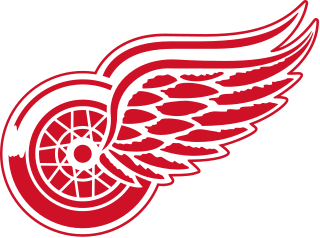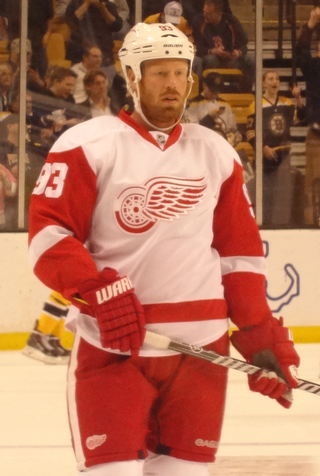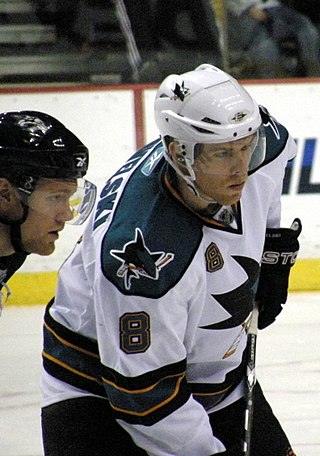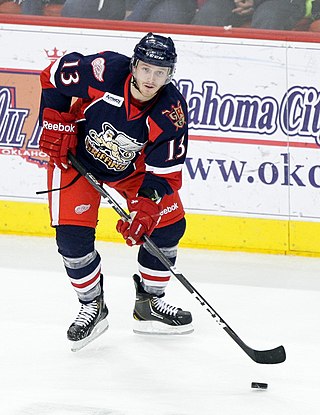
The Detroit Red Wings are a professional ice hockey team based in Detroit. The Red Wings compete in the National Hockey League (NHL) as a member of the Atlantic Division in the Eastern Conference, and are one of the Original Six teams of the league. Founded in 1926, the team was known as the Detroit Cougars until 1930. For the next two seasons, the team was named the Detroit Falcons, before changing their name to the Red Wings in 1932.

The Nashville Predators are a professional ice hockey team based in Nashville, Tennessee. The Predators compete in the National Hockey League (NHL) as a member of the Central Division in the Western Conference, and have played their home games at Bridgestone Arena since 1998. Their television broadcasting rights are held by Bally Sports South, and the Nashville Predators Radio Network flagship station is WPRT-FM. The Predators are currently affiliated with two minor league teams: the Milwaukee Admirals of the American Hockey League (AHL), and the Atlanta Gladiators of the ECHL.

Pavel Valerievich Datsyuk is a Russian former professional ice hockey player. Datsyuk was nicknamed the "Magic Man" honoring his incredible stickhandling and creativity with the puck. From 2001 to 2016, he played for the Detroit Red Wings of the National Hockey League (NHL). In 2017, Datsyuk was named one of the "100 Greatest NHL Players" in history, and was the only active player outside of the NHL at the time of announcement.

Claude Percy Lemieux, is a Canadian former professional ice hockey player who played 21 seasons in the National Hockey League (NHL) for six teams between 1983 and 2009. Lemieux won four Stanley Cup championships during his career, two with the New Jersey Devils, with whom he won the Conn Smythe Trophy during the team's victory in the 1995 Stanley Cup Finals. He is one of only 11 players to win a Stanley Cup championship with at least three teams. He is also known as one of the best playoff performers, as his 80 career playoff goals are the ninth most in NHL history.

Christopher John Osgood is a Canadian former professional ice hockey goaltender who is currently a Detroit Red Wings studio analyst and part-time color commentator for Bally Sports Detroit. He won three Stanley Cup championships in his career, all with the Red Wings, with two of them coming while he was starting goaltender. He is ranked 13th in wins in NHL regular season history with 401.

Henrik Zetterberg is a Swedish former professional ice hockey forward. He played his entire National Hockey League career, from 2002 to 2018, with the Detroit Red Wings of the National Hockey League (NHL), for whom he would serve as captain for his final six seasons.
The 2001–02 NHL season was the 85th regular season of the National Hockey League. Thirty teams competed in an 82-game regular season. The regular season began on October 3, and the playoffs concluded on June 13, with the Detroit Red Wings defeating the Carolina Hurricanes in the Stanley Cup Finals in five games, winning their tenth Stanley Cup in franchise history.
The 1954–55 NHL season was the 38th season of the National Hockey League. The Detroit Red Wings were the Stanley Cup champions as they defeated the Montreal Canadiens four games to three in the best-of-seven final series. The Canadiens were without star forward Maurice 'Rocket' Richard who had been suspended for the playoffs, a suspension which led to the March 17, 1955 "Richard Riot" in Montreal.

Johan Marcus Gunnar Franzén is a Swedish former professional ice hockey winger who played 11 seasons for the Detroit Red Wings of the National Hockey League (NHL). His career ended early in the 2015–16 season due to post-concussion syndrome. He also played for Linköpings HC in the Elitserien.

Al the Octopus is the mascot of the Detroit Red Wings of the National Hockey League. During many games, octopuses are thrown onto the ice by fans for good luck, this usually occurring after the national anthem is sung or after a goal is scored.

Joseph James Pavelski is an American professional ice hockey player and alternate captain for the Dallas Stars of the National Hockey League (NHL). He previously played for the San Jose Sharks for the first thirteen years of his NHL career and served as captain during his final four years with the team. He attended the University of Wisconsin and played for the Wisconsin Badgers men's ice hockey team. He is often regarded as one of the greatest Sharks of all time, having led the team to their first Stanley Cup Finals in 2016.
Al Sobotka is an American building operations manager who formerly worked for Olympia Entertainment. His responsibilities included day-to-day operations at Little Caesars Arena. Sobotka was fired on March 30, 2022. He was also involved in the operations of Cobo Arena until Olympia Entertainment relinquished management in 2011 and Joe Louis Arena until it closed for good in 2017. Sobotka is known mostly for driving the Zamboni during Detroit Red Wings games for the past 30 years and for collecting the octopuses thrown on the ice during Red Wings playoff games. The official mascot of the Red Wings is named after Sobotka. Sobotka came in second with 97,261 votes in Zamboni News' 1999 Zamboni "Driver of the Year" Award.
The 2007–08 Pittsburgh Penguins season was the franchise's 41st season in the National Hockey League (NHL). Their regular season began on October 5, 2007, against the Carolina Hurricanes and concluded on April 6, 2008, against the rival Philadelphia Flyers. The Penguins looked to improve upon their progress in the 2006–07 season after being eliminated in the first round of the Eastern Conference playoffs by the Ottawa Senators. During the season, the Penguins wore gold patches with "250" on them, honoring the city of Pittsburgh's 250th anniversary in 2008.
The history of the Detroit Red Wings begins in 1926, when the franchise began play in the National Hockey League (NHL). The professional ice hockey club was founded as the Detroit Cougars on September 25, 1926, one of three teams to join the NHL in 1926. With the demise of the Western Canada Hockey League (WCHL), the rights to the players of the Victoria Cougars were purchased by a Detroit group led by Charles A. Hughes who kept the name "Cougars" for their NHL club. The new team struggled financially; in 1930, the Cougars changed their name to the Detroit Falcons, and after being bought out of receivership by James E. Norris were renamed as the Detroit Red Wings in 1932. The team played their first game on November 18, 1926, and won their first two Stanley Cup titles in 1936 and 1937. The Red Wings have won the Cup eleven times, more than any other American team in NHL history.
The rat trick was a celebration performed by fans of the Florida Panthers of the National Hockey League (NHL) during their 1995–96 season, in which plastic rats were thrown onto the ice to celebrate goals. The term, a play on hat trick, was coined by Panthers goaltender John Vanbiesbrouck after teammate Scott Mellanby killed a rat in the locker room prior to the team's home opener with his stick, then scored two goals with the same stick. By the time the Panthers reached the 1996 playoffs, thousands of rats hit the ice after every Panthers goal, resulting in an off-season rule change by the NHL that allowed for referees to penalize the home team if fans disrupted the game by throwing objects onto the ice.

Gustav Nyquist is a Swedish professional ice hockey forward for the Nashville Predators of the National Hockey League (NHL). Nyquist was drafted 121st overall by the Detroit Red Wings in the 2008 NHL Entry Draft, with whom he spent the first portion of his NHL career. He also played for the San Jose Sharks, Columbus Blue Jackets and Minnesota Wild.

The 2012–13 Chicago Blackhawks season was the 87th season for the National Hockey League (NHL) franchise that was established on September 25, 1926. The regular season was reduced from its usual 82 games to 48 due to a lockout. The Blackhawks captured the Western Conference championship and went on to defeat the Eastern Conference playoff champion Boston Bruins in six games to capture their fifth Stanley Cup in team history.

The Avalanche–Red Wings rivalry is a historic rivalry in the National Hockey League (NHL) between the Colorado Avalanche and Detroit Red Wings. The rivalry gained notoriety during the mid-1990s and early 2000s, with the peak of the rivalry occurring from 1996 to 2002 during which stretch the two teams met in the postseason five times and combined to win five Stanley Cups, with the Red Wings winning three Stanley Cups and the Avalanche winning two during that stretch. The epicenter of the rivalry was during a March 26, 1997 game at Joe Louis Arena that featured 18 fighting majors, and 148 penalty minutes.












